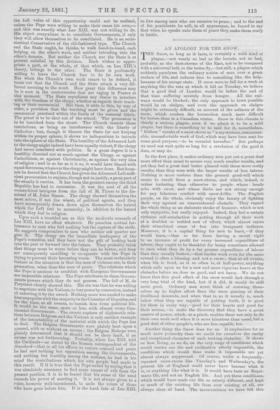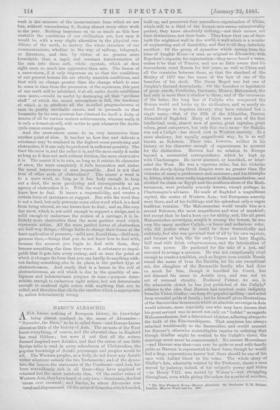AN APOLOGY FOR THE SNOW.
THE Snow, so long as it lasts, is certainly a mild kind of plague,—not nearly so bad as the locusts, not so bad, probably, as the dust-storms of the East, not to be compared with a universal boil, or the tsetse fiy,—but still, a plague which suddenly paralyses the ordinary action of man over a great surface of life, and reduces him to something like the help- lessness of his savage state. If snow were to fall for a week at anything like the rate at which it fell on Tuesday, we believe that a good deal of London would be before the end of that time suffering severely from hunger. All the rail- ways would be blocked; the only approach to town possible would be on sledges, and even the approach on sledges
might be extremely difficult, on account of the softness of the snow, which renders the locomotion much more difficult
for horses than iu a Canadian winter. Snow in this climate is clearly a serious plague, even if we admit it to be a mild plague, but there is something to be said for it, nevertheless. " Eothen " speaks of a snow-storm as " a mysterious, unaccount-
able, uncomfortable work of God, which may have been sent for some good purpose,—to be revealed hereafter." But perhaps we need not wait quite so long for a revelation of the good it does, or may do.
In the first place, it makes ordinary men put out a great deal more effort than usual to secure very much smaller results, and yet they feel a great deal better pleased with those more costly results, than they were with the larger results of less labour. Nothing is more curious than the general good-will which seems to result from a snow-storm, and which, indeed, is rather irritating than otherwise to people whose heads ache with snow, and whose limbs are not strong enough• for any hilarious conflict with snow-drifts. The English people, on the whole, obviously enjoy the luxury of fighting their way against an unaccustomed obstacle. They regard the whole thing as an elaborate stroke of humour, which is not only enjoyable, but really enjoyed. Indeed, they feel a certain virtuous self-satisfaction in getting through all their work at a doubled or trebled cost of effort, which almost raises their stimulated sense of fun into benignant radiance. Moreover, it is a capital thing for men to learn,—if they would learn,—that so far from having a moral right to an increase of profit for every increased expenditure of labour, they ought to be thankful for being sometimes allowed to earn what they do by a far greater expenditure of labour than they usually bestow,—that harder work even for the same reward is often a blessing and not a curse ; that at all events, when life is lived, as it so often is, at half-power, anything which calls upou us for a new and more vigorous heave at the obstacles before us, does us good, and not harm. We do not know that this good effect of the snow would last through a very long trial of the kind, but if it did, it would do still more good. Ordinary men never think of screwing them- selves up to higher effort than the more gaining of their livelihood demands, and when that is, as it usually is, much below what they are capable of putting forth, it is good for them in every way,—good for their hearts and good for their nerves,—to make tho discovery that they have a great reserve of power, which, at a pinch, enables them not only to do their own work well when it is more laborious than usual, but a good deal of other people's, who are less capable, too.
Another thing the Snow does for us. It emphasizes for us much more pointedly than we could for ourselves the rarity and exceptional character of snch tasking obstacles, It shows us how, living, as we do, on the very verge of conditions which would render our life and civilisation utterly impossible, the conditions which would thus make it impossible are yet almost always suppressed. Of course, under a frequently- repeated snow-storm like Tuesday's and Wednesday's, the present life of England could never have become what it is, or anything like what it is. It would have been an Esqui- rnamx life, and not an English life. And yet these conditions, which would have made our life so utterly different, and kept so much of the existing life from ever existing at all, are always close at hand. The inconvenience we have felt this week is the measure of the inconvenience from which we are free, without remembering it, during almost every other week in the year. Nothing impresses on us so much as this how unstable the conditions of our civilisation are, how easy it would be, with a very slight alteration in the physical con- ditions of the earth, to destroy the whole structure of our communications, whether in the way of railway, telegraph, or literature, and this by virtue of no process more formidable than a rapid and constant transformation of the rain into these soft, white crystals, which at first sight seem so much less aggressive than rain. The lesson of a snow-storm, if it only impresses on us that the conditions of our present human life are utterly unstable conditions, and that with no change greater than the change which is sure to come in time from the precession of the equinoxes, this part of our earth will be inhabited, if at all, under Arctic conditions once moro,—would be useful by destroying all that " perilous stuff " of which the moral atmosphere is full, the tendency of which is to attribute all the so-called progressiveness of man to purely inevitable causes, and to persuade us that humanity by its own prowess has obtained for itself a fixity of tenure of all its various modern achievements, whereas really it is only a tenant-at-will, with notice to quit whenever the Arctic cycle comes round again.
And the snow-storm seems to us very impressive from another point of view. It toadies us how fine and delicate a substance may be rendered in the highest sense paralysing and obstructive, if it can only be produced in sufficient quantity. The finer the snow is, and the softer it is, and the more easily it melts so long as it does not melt without friction, the more obstructive it is. The nearer it is to rain, so long as it retains its character of snow, the more completely it foils locomotion and makes the usual intercourse of man impossible. And is not that true of other sorts of obstruction P The nearer a word is to a mere word, so long as it has body enough to keep out a deed, the more paralysing and unconquerable as an agency of obstruction it is. With the word that is a deed, you know how to deal. It incurs a responsibility, and creates a certain force of resistance or support. But with the word that is not a deed, but only prevents some other word which is a deed from being uttered, no one knows how to deal ; and so, like very fine snow, which is not solid enough to support a sledge, and is solid enough to embarrass the motion of a carriage, it is in- finitely more obstructive than the more positive word which represents action. All the more perfect forms of obstruction are half-way things,—things liable to change their forms at the least application of pressure,—solid now, liquid then,—fluid now, gaseous then,—things that you do not know how to deal with, because the moment you begin to deal with them, they become something else than they were. A substance so impal- pable that it gets into every cranny, and so near the point at which it changes its form that you can hardly do anything with- out finding something else in its place, is the perfect type of obstructiveness. And surely that is a lesson in the evil of obstructiveness, an evil which is clue to the quantity of am- biguous and indeterminate purpose in man,—purpose deter- minate enough to embarrass right action, but not determinate enough to confront right action with anything that can be called, and therefore that elicits the emotion which is appropriate to, action determinately wrong.



































 Previous page
Previous page